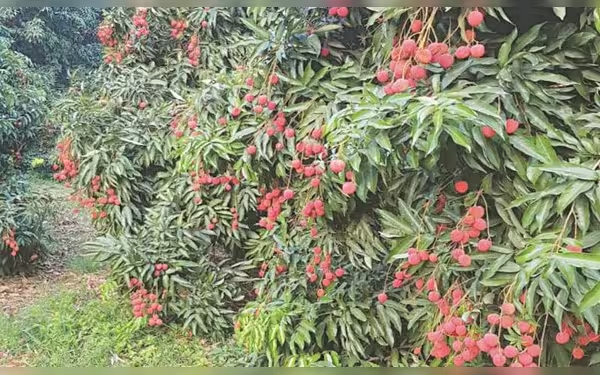Thursday, November 7, 2024 05:29 AM
Lychee Cultivation Crisis in Haripur
- Lychee orchards in Haripur face severe decline.
- Farmers struggle with climate change impacts.
- Sustainable practices are essential for survival.
 Image Credits: dawn.com
Image Credits: dawn.comLychee orchards in Haripur face challenges due to climate change, threatening local livelihoods and economy. Sustainable practices are crucial for survival.
The lychee, a tropical fruit known for its sweet and juicy flavor, has been a cherished part of Pakistan's agricultural landscape. However, the cultivation of this luscious fruit is facing significant challenges, particularly in the Panjkatha area of Haripur. With only about 125 acres (approximately 50 hectares) of lychee orchards remaining, the future of this beloved fruit hangs in the balance.
Local fruit contractors, like Mumtaz Khan, who serves as the district director for agriculture in Haripur, are deeply concerned about the declining lychee orchards. Khan emphasizes the importance of educating farmers on adopting climate-resilient agricultural practices. This initiative is crucial as climate change continues to impact farming conditions, making it increasingly difficult for farmers to maintain their crops.
Farmers in the region are facing numerous challenges, including unpredictable weather patterns, pests, and diseases that threaten their lychee production. The sweet fruit, which thrives in specific climatic conditions, is becoming harder to cultivate as temperatures rise and rainfall becomes erratic. This situation not only affects the farmers' livelihoods but also the local economy, which relies on the sale of lychee.
To combat these issues, the agricultural department is working closely with farmers to implement sustainable practices. These practices include better water management, soil conservation techniques, and the use of resistant plant varieties. By adopting these methods, farmers can enhance their resilience against climate change and ensure the survival of their lychee orchards.
Moreover, the community's involvement is vital. Farmers are encouraged to share their experiences and learn from one another. This collaborative approach fosters a sense of unity and helps everyone adapt to the changing agricultural landscape. As the saying goes, "many hands make light work," and in this case, collective efforts can lead to a brighter future for lychee cultivation.
While the situation for lychee orchards in the Panjkatha area is concerning, there is hope. With the right education and support, farmers can adapt to the challenges posed by climate change. The preservation of lychee cultivation is not just about maintaining a fruit; it is about sustaining livelihoods and preserving a vital part of the local culture. As we move forward, it is essential to prioritize sustainable agricultural practices to ensure that future generations can enjoy the sweet taste of lychee.













